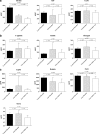Effect of Laparoscopic Sleeve Gastrectomy on Fasting Gastrointestinal, Pancreatic, and Adipose-Derived Hormones and on Non-Esterified Fatty Acids
- PMID: 27465935
- PMCID: PMC5237658
- DOI: 10.1007/s11695-016-2302-1
Effect of Laparoscopic Sleeve Gastrectomy on Fasting Gastrointestinal, Pancreatic, and Adipose-Derived Hormones and on Non-Esterified Fatty Acids
Abstract
Background: Alterations in gastrointestinal, pancreatic, and adipose hormone levels may have a greater role in weight loss than initially appreciated. The laparoscopic sleeve gastrectomy (LSG) operation is now the most frequently performed bariatric operation in many countries, but there are relatively few data regarding its molecular effects. We sought to characterize the effect of LSG on fasting plasma levels of selected hormones and on non-esterified fatty acids (NEFA), and to compare these to levels in non-obese control individuals.
Materials and methods: The levels of nine plasma hormones were measured using a multiplex bead-based assay at baseline and at 3 months after operation in 11 obese patients undergoing LSG. NEFA levels were also measured. The levels were compared to those for 22 age- and sex-matched non-obese individuals.
Results: At baseline, obese patients showed significantly higher expression of C-peptide, insulin, and leptin and significantly lower ghrelin, glucose-dependent insulinotropic peptide (GIP), and resistin compared to non-obese controls (p < 0.05). LSG resulted in a reduction in BMI from 42.5 ± 6.47 kg/m2 at operation to 35.2 ± 5.14 kg/m2 at 3 months (42 % mean excess weight loss, p < 0.001). LSG led to a significant decrease in ghrelin, glucagon-like peptide-1 (GLP-1), glucagon, leptin, plasminogen activator inhibitor-1 (PAI-1), and NEFA.
Conclusion: LSG induces marked early changes in the fasting levels of factors thought to be important regulators of obesity and metabolic health. These changes differ somewhat from the findings for operations with a malabsorptive component, suggesting that subtle differences exist in the mechanisms of weight loss between LSG and other bariatric operations.
Keywords: Bariatric surgery; C-peptide; GIP; GLP-1; Ghrelin; Glucagon; Insulin; Leptin; NEFA; PAI-1; Resistin; Sleeve gastrectomy; Weight loss.
Conflict of interest statement
The authors declare that they have no conflict of interest. Ethical Approval All procedures performed in studies involving human participants were in accordance with the ethical standards of the institutional and/or national research committee and with the 1964 Helsinki declaration and its later amendments or comparable ethical standards. Informed Consent Informed consent was obtained from all individual participants included in the study.
Figures

Similar articles
-
Effect of laparoscopic Roux-en-Y gastric bypass versus laparoscopic sleeve gastrectomy on fasting gastrointestinal and pancreatic peptide hormones: A prospective nonrandomized trial.Surg Obes Relat Dis. 2018 Oct;14(10):1521-1529. doi: 10.1016/j.soard.2018.06.003. Epub 2018 Jun 14. Surg Obes Relat Dis. 2018. PMID: 30449509 Clinical Trial.
-
Laparoscopic sleeve gastrectomy differentially affects serum concentrations of FGF-19 and FGF-21 in morbidly obese subjects.Obesity (Silver Spring). 2013 Jul;21(7):1335-42. doi: 10.1002/oby.20208. Epub 2013 May 13. Obesity (Silver Spring). 2013. PMID: 23670968
-
Alterations in gut hormones after laparoscopic sleeve gastrectomy: a prospective clinical and laboratory investigational study.Ann Surg. 2013 Apr;257(4):647-54. doi: 10.1097/SLA.0b013e31826e1846. Ann Surg. 2013. PMID: 23108120
-
Effect of Sleeve Gastrectomy on Ghrelin, GLP-1, PYY, and GIP Gut Hormones: A Systematic Review and Meta-analysis.Ann Surg. 2020 Jul;272(1):72-80. doi: 10.1097/SLA.0000000000003614. Ann Surg. 2020. PMID: 31592891
-
Effect of Laparoscopic Sleeve Gastrectomy on Serum Adipokine Levels.Physiol Res. 2023 Jul 31;72(Suppl 2):S165-S172. doi: 10.33549/physiolres.935053. Physiol Res. 2023. PMID: 37565420 Free PMC article. Review.
Cited by
-
Shp2 suppresses fat accumulation in white adipose tissue by activating Wnt/β-catenin signaling following vertical sleeve gastrectomy in obese rats with type-2 diabetes.Exp Ther Med. 2022 Apr;23(4):302. doi: 10.3892/etm.2022.11231. Epub 2022 Feb 22. Exp Ther Med. 2022. PMID: 35340882 Free PMC article.
-
Evolution of Inflammatory and Oxidative Stress Markers in Romanian Obese Male Patients with Type 2 Diabetes Mellitus after Laparoscopic Sleeve Gastrectomy: One Year Follow-Up.Metabolites. 2020 Jul 28;10(8):308. doi: 10.3390/metabo10080308. Metabolites. 2020. PMID: 32731443 Free PMC article.
-
Serum free fatty acid levels and insulin resistance in patients undergoing one-anastomosis gastric bypass.Wideochir Inne Tech Maloinwazyjne. 2022 Mar;17(1):194-198. doi: 10.5114/wiitm.2021.107754. Epub 2021 Jul 13. Wideochir Inne Tech Maloinwazyjne. 2022. PMID: 35251406 Free PMC article.
-
Progress in treatment of type 2 diabetes by bariatric surgery.World J Diabetes. 2021 Aug 15;12(8):1187-1199. doi: 10.4239/wjd.v12.i8.1187. World J Diabetes. 2021. PMID: 34512886 Free PMC article. Review.
-
Mechanisms of weight loss and improved metabolism following bariatric surgery.Ann N Y Acad Sci. 2018 Jan;1411(1):53-64. doi: 10.1111/nyas.13409. Epub 2017 Sep 3. Ann N Y Acad Sci. 2018. PMID: 28868615 Free PMC article. Review.
References
-
- Garb J, Welch G, Zagarins S, Kuhn J, Romanelli J. Bariatric surgery for the treatment of morbid obesity: a meta-analysis of weight loss outcomes for laparoscopic adjustable gastric banding and laparoscopic gastric bypass. Obes Surg. 2009;19(10):1447–1455. doi: 10.1007/s11695-009-9927-2. - DOI - PubMed
MeSH terms
Substances
LinkOut - more resources
Full Text Sources
Other Literature Sources
Medical
Miscellaneous

